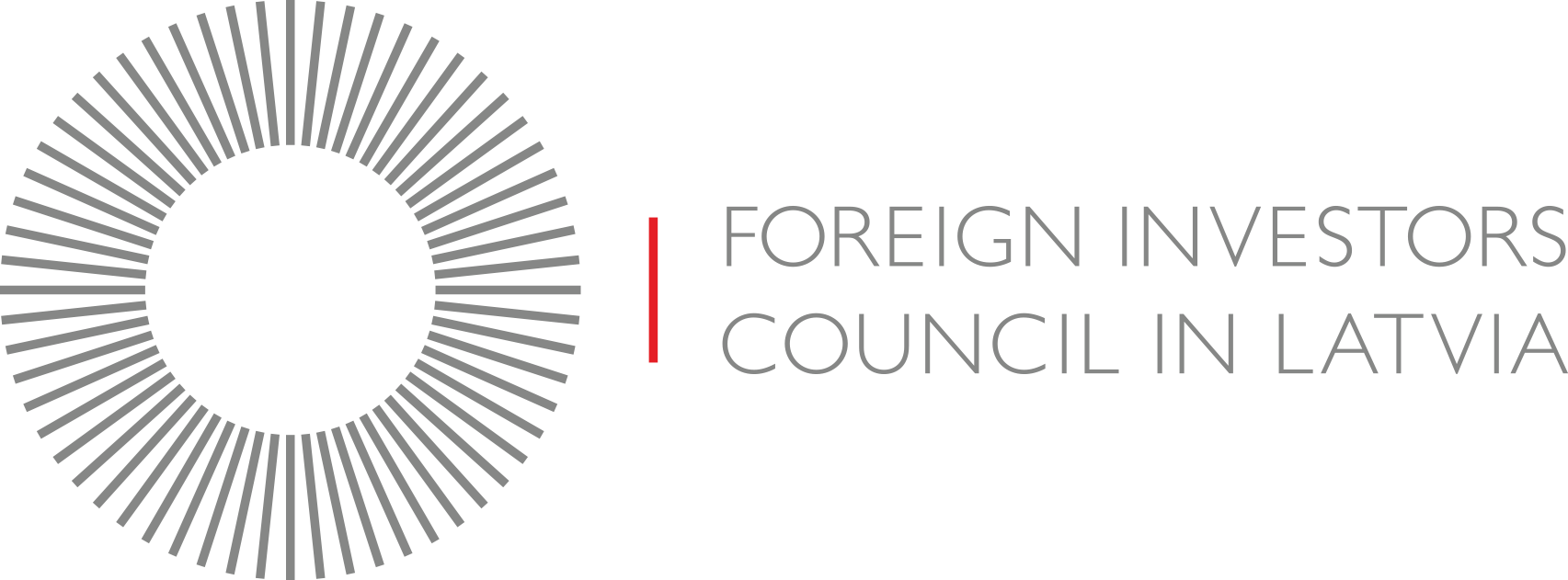FICIL recognises progress in the public procurement system of Latvia, although calls for continued reforms that would address existing challenges and, thereby, stimulate economic development. The concerns of favouritism of the state-owned companies, corruption and unfair practices in public procurement should be dispelled to boost confidence of the foreign investors and present Latvia as the most investment secure country in the Baltics!
Persisting challenges of the public procurement system and their impacts
Public procurement is an important instrument of the governments, as it ensures service delivery (e.g., road or school construction, supply of equipment for hospitals, expert advice) that is in public interest, and accounts for a large share of the taxpayers’ money. In Latvia, in 2023 the total financial value of procurement contracts awarded was EUR 5.4 billion (excluding VAT), which accounts for 14% of GDP.[1] Public procurement is expected to foster public sector efficiency, high quality of provided services, trust, transparency and fair market competition. In addition, an effective public procurement system may stimulate innovation, attract foreign investment and promote economic development by boosting demand in the private sector.
The State Audit Office, the Foreign Investors Council in Latvia (FICIL) and other stakeholders have been raising numerous concerns about the effectiveness and efficiency of the current public procurement system in Latvia. The challenges of the public procurement are well known.[2] Among them are listed:
- Complex national public procurement regulations and fragmented procurement management: overly complicated, fragmented regulatory and institutional frameworks make procurement procedures difficult to understand and execute for both contracting authorities and suppliers, creating high administrative burden and raising costs. Centralisation of public procurement has been advised for many years, yet progress remains slow.
- Insufficient professional capacity: contracting authorities often lack the skills and knowledge needed to design and manage complex procurement processes, especially in sectors like construction and IT.
- Lack of transparency and inconsistent tender practices: public sector entities apply procurement rules and standards inconsistently, leading to a lack of predictability and fairness in tendering procedures. This raises concerns about unfair competition, corruption, favouritism (especially of the state-owned companies) and conflict of interest.
- Price over quality: from 2021 to 2023, in around 73% of procurement procedures in Latvia, price was the sole criterion, often at the expense of quality.[3]
The above-listed challenges discourage foreign investors and local companies to participate in the public procurement, which, in turn, decreases the availability of high-quality proposals, project outcomes, efficiency, and results in a weak competition. Additionally, it increases corruption levels in the country – based on the Corruption Perceptions Index (CPI), in 2024 the corruption level in Latvia is higher (59 score) than in Estonia (74 score) and Lithuania (63 score).[4] Based on the latest FICIL Sentiment Index research, favouritism of the state-owned companies, concerns about fairness and transparency of the public procurement processes are much more pronounced in Latvia than in other Baltic States – Estonia and Lithuania.[5]
Comparative view on public procurement – EU and Baltic States
When public procurement indicators are compared with the EU and other Baltic States, Latvia’s performance is in line with the EU average on the share of single-bidder procedures (i.e., proportion of contracts awarded where there was just a single bidder) and in terms of direct awards without a bid (i.e., proportion of procurement procedures negotiated with a company without any call for bids). However, such levels are not considered satisfatory by the EU, as for single bidders the satisfactory performance would be below 10%, while for direct awards without a bid below 5%.[6] In contrast to Estonia and Lithuania, Latvia less frequently accepts the offer based on a cheapest price, altough its performance is below the EU average, and the average procurement decision time is much longer than in the neighbouring Baltic States. Overall, improvements in the public procurement system of Latvia are noticeable throughout years, but it should not serve as an excuse for avoiding addressing the challenges.
Single Market and Competitiveness Scoreboard data of the European Commission[7]
| Indicator | Latvia | Estonia | Lithuania | EU Average |
| Single-bidder procedures (%) | 28% | 26% | 37% | 29% |
| Direct awards without a bid (%) | 8% | 12% | 6% | 8% |
| Award to lowest price (%) | 74% | 80% | 90% | 60% |
| Average procurement decision time (days) | 72 | 53 | 66 | 99 |
Despite that the general situation on public procurement in Latvia might not look grim in statistical terms, especially when compared to other countries, a closer look is needed to understand the severity and impact of existing challenges. For this purpose, a few illustrations are provided below.
A few cases that raise concerns of the foreign investors in Latvia
Favouritism of the state-owned companies is not an unfamiliar concept in Latvia, especially in the context of the public procurement. The importance of the state-owned companies for economic development and stabilisation certainly should not be questioned, especially in the times of crisis – this is reflected in numerous research publications.[8] However, the government support of the state-owned companies should never translate into practices that foster unfair market competition, violate transparency and justify favouritism. In Latvia, the risks of favouritism in the public procurement are higher for companies that work in the energy, telecommunications, transportation and other natural resource-associated industries. To illustrate, in the telecommunications industry, the large foreign investors, such as Bite Latvija and TELE2, suspect favouritism of the state-owned company Latvijas Mobilais Telefons (LMT). Below are provided two examples, where the offer of Bite Latvija is several times cheaper than of LMT, yet LMT wins both bids. Both TELE2 and Bite Latvija, at times, put the price of their bids against LMT at 0…and yet lose anyway. The foreign investors argue that without well-defined, standardised and transparent criteria for the selection of winning bids, the public procurement system can be easily manipulated both at a stage of the design of criteria for a specific tender or at a stage of the proposal evaluation. In an effort to ensure fairness and effectiveness of the public procurement system in Latvia, the companies suggest to develop an e-catalogue – a procurement model for homogeneous services (e.g. mobile communications) that outlines a non-changing set of criteria and conditions for winning a tender. FICIL supports the proposal, as it would foster transparency and reduce the risks of favouritism.
| Contracting authority and name of the procurement | Bidders | Price, EUR, without VAT |
| Riga Stradins University
“Mobile Communications Services” (Procurement Identification No. RSU 2024/102/MI) |
“BITE Latvija” SIA | EUR 7.09 |
| “Latvijas Mobilais Telefons” SIA | EUR 19.52 | |
| Sigulda Municipality (Reg. No. 90000048152)
“Providing mobile communications for the administration and institutions of Sigulda Municipality” (Identification No. – SNP 2022/04) |
SIA “BITE Latvija” | EUR 3.00 |
| SIA “Latvijas Mobilais Telefons” | EUR 23.50 |
The cases of direct award without a bid frequently raise questions among the foreign investors. In some cases it can be justified – when a service can be provided only by a specific provider, but when it is offered by various companies, at times at a lower cost and with a higher quality, it is difficult to find a reasonable argument in support of such direct awards. To illustrate, currently the Ministry of Transport plans to extend the rights to provide the Universal Postal Services to the existing partner (in this case Latvijas Pasts). In view of several foreign investors and the Association of Postal Merchants (PKB), such action is restricting competition and prevents other market players from offering potentially better services and parcel delivery solutions.
To illustrate, a few months ago, FICIL confronted the Ministry of Economics with questions about the direct award without a bid to the think tank LV PEAK of the University of Latvia, with which the Ministry has long-term relations. The think tank was requested to conduct a research project – an impact assessment of the Human Capital Development Strategy that has not been approved by the Parliament yet. Once the political priorities of the government changed, the Strategy was scaled down and reframed into a small Plan, the need for an impact assessment of the Strategy disappeared, but not the research project. The research project to LV PEAK was reframed – its new aim was to develop a monitoring system of the Plan. For FICIL it raised a question – was there really a need for an impact assessement if the Strategy was not approved and implemented yet, or a need for a monitoring system of the small Plan? As highlighted earlier, it is difficult to judge, but public procurement without the open tendering, especially between two publicly financed organisations, where some employees work at both of them, may always look suspicious.
FICIL is committed to ensuring investment secure climate in Latvia
In the last half a year FICIL held several meetings with the Competition Council, State Audit Office and Corruption Prevention and Combating Bureau (KNAB), discussing effectiveness of the current public procurement system. The institutions recognise the system’s imperfections, although pointing to progress in several areas, and express willingness to collaborate on improving the system. Māris Butāns, FICIL expert on Fair Competition & Public Procurement and Senior Manager at PwC Legal emphasized: “The work of these institutions should be safeguarded from political pressures to ensure their neutrality and objective judgement. Should the contracting authority have other reasons for consistently being loyal to certain service providers, these instances should be openly addressed and the root cause investigated to ensure alignment of effective use of public funds and meeting the needs of the purchasing authority”. FICIL is committed to investment protection, therefore we continue to call on the government of Latvia to continue implementing reforms that would make the public procurement system more effective and efficient, while stimulating attraction of foreign investment and economic development. The information on our recommendations is available in the official letters.[9],[10]
References:
[1] https://lrvk.gov.lv/lv/getrevisionfile/29779-41W-xQrqkMfk5f9mcdGNYHfubMRhVAHn.pdf
[2] https://www.ficil.lv/wp-content/uploads/2025/01/240517_FICIL-par-ieteikumiem-publisko-iepirkuma-procesa-pilnveidei94.pdf
[3] https://lrvk.gov.lv/lv/getrevisionfile/29779-41W-xQrqkMfk5f9mcdGNYHfubMRhVAHn.pdf
[4] https://www.transparency.org/en/cpi/2024
[5] https://www.ficil.lv/wp-content/uploads/2025/05/FICIL-Sentiment-Index-report_2024-1.pdf
[6] https://single-market-scoreboard.ec.europa.eu/business-framework-conditions/public-procurement_en
[7] https://single-market-scoreboard.ec.europa.eu/business-framework-conditions/public-procurement_en
[8] OECD (2020), “The COVID-19 crisis and state ownership in the economy: Issues and policy considerations”, OECD Policy Responses to Coronavirus (COVID-19), OECD Publishing, Paris, https://doi.org/10.1787/ce417c46-en.
[9] https://www.ficil.lv/wp-content/uploads/2025/01/240517_FICIL-par-ieteikumiem-publisko-iepirkuma-procesa-pilnveidei94.pdf
[10] https://www.ficil.lv/wp-content/uploads/2025/01/240123_FICIL-par-publisko-iepirkumu.pdf


